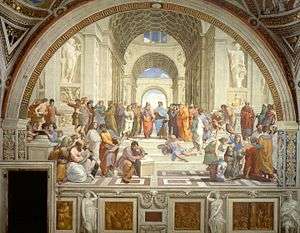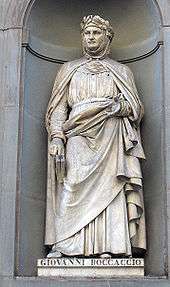Renaissance literature
| Renaissance |
|---|
 |
| Topics |
| Regions |


Renaissance literature refers to European literature which was influenced by the intellectual and cultural tendencies associated with the Renaissance. The literature of the Renaissance was written within the general movement of the Renaissance which arose in 14th-century Italy and continued until the 16th century while being diffused into the western world. It is characterized by the adoption of a humanist philosophy, the recovery of the classical literature of Antiquity and benefited from the spread of printing in the latter part of the 15th century. For the writers of the Renaissance Greco-Roman inspiration was shown both in the themes of their writing and in the literary forms they used. The world was considered from an anthropocentric perspective. Platonic ideas were revived and put to the service of Christianity. The search for pleasures of the senses and a critical and rational spirit completed the ideological panorama of the period. New literary genres such as the essay (Montaigne) and new metrical forms such as the sonnet (Petrarch) and Spenserian stanza made their appearance.
The impact of the Renaissance varied across the continent; countries that were predominantly Catholic or Protestant experienced the Renaissance differently. Areas where the Orthodox Church was culturally dominant, as well as those areas of Europe under Islamic rule were more or less outside its influence. The period focused on self-actualization and one's ability to accept what is going on in one's life.
The earliest Renaissance literature appeared in Italy in the 14th century; Dante, Petrarch, Boccaccio, Machiavelli and Ariosto are notable examples of Italian Renaissance writers. From Italy the influence of the Renaissance spread at different times to other countries and continued to spread around Europe through the 17th century. The English Renaissance and the Renaissance in Scotland date from the late 15th century to the early 17th century. In northern Europe the scholarly writings of Erasmus, the plays of Shakespeare, the poems of Edmund Spenser and the writings of Sir Philip Sidney may be considered Renaissance in character.
The creation of the printing press (using movable type) by Johannes Gutenberg in the 1450s encouraged authors to write in their local vernacular instead of Greek or Latin classical languages, thus widening the reading audience and promoting the spread of Renaissance ideas.
See also
- Dutch Renaissance and Golden Age literature
- British literature#The Renaissance
- English Renaissance
- Elizabethan literature
- English Renaissance theatre
- French Renaissance literature
- Spanish Renaissance literature
- Italian Renaissance literature
- High Renaissance
- German literature#German Renaissance and Reformation
- Swedish literature#Renaissance literature
- Polish Renaissance literature
- Portuguese Renaissance and Portuguese literature#First classical phase: The Renaissance
Literature by century
- 14th century in literature
- 15th century in literature
- 16th century in literature
- 17th century in literature